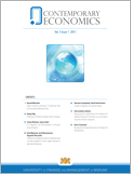Measuring the Impact of Inbound Tourists, Outbound Tourists and Overall Tourism Growth on Sustainable Ecological Footprint of ASEAN Countries: A Panel Data Analysis
Measuring the Impact of Inbound Tourists, Outbound Tourists and Overall Tourism Growth on Sustainable Ecological Footprint of ASEAN Countries: A Panel Data Analysis
Author(s): Khunanan Sukpasjaroen, Thitinan ChankosonSubject(s): Energy and Environmental Studies, Human Ecology, Environmental interactions, Accounting - Business Administration, Tourism
Published by: Akademia Ekonomiczno-Humanistyczna w Warszawie
Keywords: Ecological footprint; outbound tourism; inbound tourism; GMM;
Summary/Abstract: The tourism industry is one of the most rapidly developing industries in the world and tourism in the Southeast Asian region has been developing in the past few years. The present study focuses on the data from the ASEAN region to study the association among the variables; inbound tourists, outbound tourists, tourism growth and ecological footprint. The period between 1995-2019 was the subject of study. The data for these indicators was extracted from the WDI. The econometric tools of heteroskedasticity, autocorrelation, unit root, cross-sectional dependence were applied in order to evaluate different dimensions of the data. In the estimation of regressors the panel corrected standard error and the one step system of generalized method of moments were used. The results of the estimations reveal that the effects of the regressors were significant. However, inbound tourism and tourism growth showed negative associations with the ecological footprints of the study units. The past and present studies show that the increase in the tourist activities decrease the ecological footprint and thereby increase the environmental quality of the economies. The present study is original and poses major contributions to the academic literature and also has policy making implications.
Journal: Contemporary Economics
- Issue Year: 14/2020
- Issue No: 4
- Page Range: 490-500
- Page Count: 11
- Language: English

